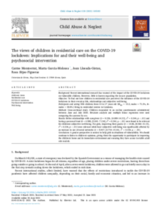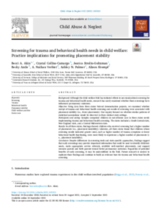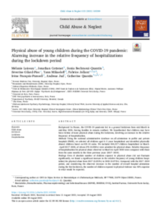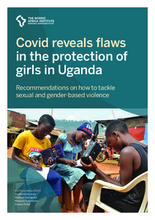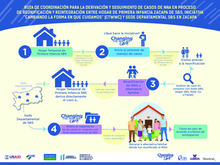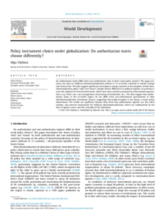Displaying 2171 - 2180 of 14391
Recent international research has warned of the impact of the COVID-19 lockdown on vulnerable children. However, little is known regarding the in-care population. The objective of this study was to find out how children in residential care perceived the influence of the COVID-19 lockdown in their everyday life, relationships and subjective well-being. Participants and setting: 856 children from 10 to 17 years old (Mage = 15.5, males = 71.2%, females = 28.8%) living in residential centres in Catalonia.
Findings of this report suggest that early screenings for trauma and behavioral health needs may provide important information that could be used to identify children's needs, make appropriate service referrals, establish well-matched placements, and support resource parents and birth parents toward better permanency outcomes.
In France, the COVID-19 pandemic led to a general lockdown from mid-March to mid-May 2020, forcing families to remain confined. This study found a significant increase in the relative frequency of young children hospitalized for physical abuse from 2017 (0.053%) to 2020 (0.073%).
Through 2020 and 2021, the COVID-19 pandemic led to prolonged school closures in Uganda. These closures exacerbated sexual and gender-based violence (SGBV) against girls.
This panel discussed coronavirus-associated caregiver loss and the work being done by the international community, the U.S. government, and faith-based actors to support vulnerable children and turn the tide toward better care. It was moderated by Gillian Huebner, executive director of the Georgetown University Collaborative on Global Children’s Issues.
Developed by Family for Every Child's Disability Working Group, the toolkit aims to strengthen the capacity of CSOs, social workers, service providers, government institutions and Members of the Family Alliance to include children with disabilities and their families in their advocacy, service delivery or other work. During the workshop, Disability Working Group members will share more on the purpose and vision of the toolkit, and demonstrate how to use it.
This panel will discuss coronavirus-associated caregiver loss and the work being done by the international community, the U.S. government, and faith-based actors to support vulnerable children and turn the tide toward better care. It will be moderated by Gillian Huebner, executive director of the Georgetown University Collaborative on Global Children’s Issues.
Esta ruta fue aprobada por la Secretaría de Bienestar Social para ser utilizada en Zacapa por los trabajadores sociales y psicólogas que están involucrados en el proceso de manejo de caso para la reintegración de los niños y niñas del cuidado residencial hacia el cuidado familiar. Esta diseñada para apoyar la celeridad de los procesos y atención a casos.
The paper presents new data on childcare deinstitutionalization policies in 15 ex-Soviet countries in Eastern Europe and Central Asia. The data suggest significant convergence among countries in the adoption of both deinstitutionalization policy ‘ends’ and ‘means’, despite drastic differences in political regimes.
Grandmothers are important in Chinese families. This study explored the early emerging mother-grandmother-infant network and its association with a child's socioemotional development in multigenerational families in a non-WEIRD country.

